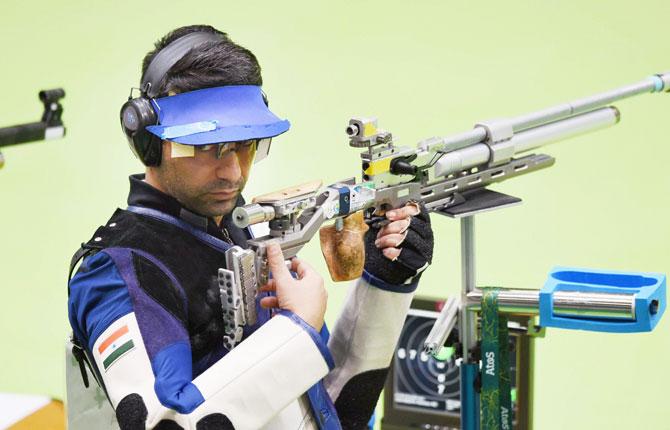'I did not end up fourth because of the neurological condition. I did not end up fourth because of a tremor in my hand. The fact is I ended up fourth because I was not good enough for third (place)'

India's lone individual Olympic gold medal winner Abhinav Bindra revealed on Friday that in 2014 he suffered from a serious neurological-medical condition, the after effects of which left his hands in complete tremors.
"It's in 2014, I was diagnosed by somewhat serious neurological-medical condition, the after effects of which left my hand in complete tremors. So my hand just keeps shaking, I pursued a sport which required my hands to be stable, but my system and my condition just, it was kind of difficult," he said.
Bindra, who won a gold medal in 10m Air Rifle event in the 2008 Beijing Olympics, was speaking at a session at the India Today Conclave 2017 in Mumbai.
Boria Majumdar, who was moderating the session, said the condition was known as 'Epilepsy' and despite suffering from that, Bindra won a Commonwealth Games gold in 2014 before coming close to winning a medal in Rio Olympics.
Bindra, however, refused to attribute his fourth place finish in Rio Games (in 10m Air Rifle) to his medical condition but said that he was not good enough for the third spot.
"I ended up fourth at the Olympic Games in Rio. And I did not end up fourth because of the neurological condition. I did not end up fourth because of a tremor in my hand. The fact is I ended up fourth because I was not good enough for third (place)," Bindra asserted.
He also stressed on the need to put systems in place if the country wants to start winning medals at the Olympics.
"No, for 2020 (Olympics), time is too short. Just a couple of years down the road and you can't really make any significant changes. You have to just try and streamline whatever you have. It would be a mistake to completely, radically change everything. Any change takes time to set in," the 34-year-old shooter said when asked about the road ahead for Indian sports.
"In all fairness, we should just forget 2020 (Olympics) and maybe start working for 2024 (Olympics) and beyond 2024, 2028 (Olympics). That requires the systems, that requires long term investment, that requires patience. We need to set systems in order and hopefully those systems and investments that you put in through a significant amount of time will bear fruit sometimes down the road. (And) that requires a lot of systems and that is something that the state has to decide," he added.
"If sporting success is important to us and if it's high on our priority, then we are going to do it, and we are going to it by getting best people in the world and try and set those systems up in this country. There is huge amount of talent that exists, except that (the) talent needs to be nurtured right from the grassroots and taken up to the Olympic level," he signed off.








